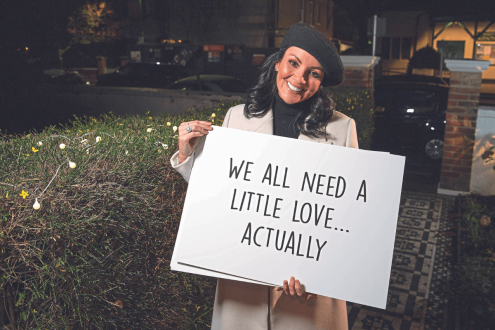How to stand up for something you believe in… and change your life
When Rachel Garnett heard her neighbourhood pool was under threat, she felt sad, but what could she do? Then she decided to make a stand – and it changed her

When I found out that our local pool, in a culturally diverse borough of London, was to be closed, I swore, and then I cried. Swearing showed my sheer frustration with government cuts that meant councils were struggling to maintain such facilities; weeping because I couldn’t bear the thought of the pool being boarded up, drained and lost forever.
For me, swimming is a lifesaver, and not just in the obvious way. It enables me to deal with a health issue and it has helped me come to terms with a challenging upbringing. It even helped me keep my sense of humour when my fabulous mother-in-law stored food in the bath as her Alzheimer’s took hold. Without it, quite frankly, I would have needed to access more mental and physical health services.
I know I am not alone in this. As well as giving you a fit, strong body, a YouGov poll by Swim England last year found that swimming significantly reduces symptoms of anxiety and depression. Incredibly, the study showed that almost half a million adults with mental health conditions who swim regularly say they have reduced their medication or no longer take it which, of course, saves the NHS money.* The unique atmosphere of being supported by water and the rhythmic, aerobic exercise are credited with contributing to this improvement in their emotional health.
For me, the swimming bath wasn’t a busy, rather down-at-heel, local-authority pool – it was a glorious, life-enhancing spa! Often, society pays lip service about welcoming diversity and promoting inclusion, but go to a public pool and see that in action without fanfare or fuss.
I wanted to do something but I was so busy. I knew the pool had a group of dedicated people campaigning to keep it open. Amazingly, they had saved it once before – but this time a date had been set for its closure.
You mean me?
The day I heard the pool was in trouble, I charged in just before closing time – my first free minutes of the day. The place was packed with people wanting to save our pool. Despite a twinge of guilt, I thought, great, they’re on it, so I don’t need to be. Petitions were being printed and put online, so I signed and grabbed extra copies to get signatures.
But, as the days went on, my guilt grew and I felt terrible using the pool while not getting more involved. I was struggling to sleep – always a red flag for me that something is getting to me. Everywhere I went, my petition came with me and signatures were filling it. I needed this pool, as did so many others. Every time I thought about it closing, I felt devastated. On the upside, my three-year-old learned a new word, ‘petition’. Still, I kept my distance from the heart of the campaign.
What finally pushed me into realising I needed to woman up and get immersed in the community crusade was watching the difference our pool made to a father and his son, who had disabilities. During my swim one day, I saw the boy lowered into the pool – his delight as his body was buoyed by the water was almost tangible; his father’s expression changed from exhaustion to joy and pride. Maybe he didn’t have the energy or time to get involved, but I did! I needed to do something for them. I cut short my swim, went home and got in touch with campaign HQ. I offered to help with PR and to progress talks with the council.
It is well known that taking action and tackling head-on the very things you find worrying is beneficial. I slept soundly that night for the first time since hearing the bad news, aligned with my principles and values.
Aside from work, the pool took over my headspace and time. I would be on my laptop emailing as my ailing mother-in-law chatted about being an evacuee; as we wondered what to have for dinner. My family lived on baked potatoes and quiche – I didn’t have time to cook, I was too busy organising articles to keep our efforts in the media spotlight, or writing to community leaders with influence.
Our ducks in a row
I felt like I imagine it feels to prepare for battle – worried but energised and alert. I met new people, including swimmers who were in the pool before I even woke up in the morning. I became an expert in pool boilers – ours were old and a financial concern for the council, and we needed to have all bases covered for when we went into discussion. We got together a good case about the benefits of keeping the pool open: the knock-on effect it had for the struggling local economy, its popularity, the lack of facilities, particularly for young people, the health benefits of swimming and the sports funding we thought the council could access. We had a plan for the boilers too.
Along with three members of the campaign group, I went to meet council members. I can truthfully say I have never been more nervous. I don’t mind public speaking, but the responsibility felt huge and personal. I wanted to make the pool real to council members. The emotion got to me and my voice kept breaking. We knew it was a tough decision but the council seemed receptive and, for the first time, I felt hopeful.
In it together
Weeks passed and we soldiered on. I was like a windmill on our high street – constantly waving at people I knew through the campaign. It felt comforting that so many of us were working for the same cause.
Amazingly, the volume of petition signatures triggered a council debate in the town hall. The local press came along to take photos of us waving our banners. As we took our seats in the gallery, the council members came in and, to our joy, announced that the pool would stay open!
The next day, I went for a swim. As the sunset reflected on the pool, softening its concrete edges, shading its scruffy tiles and enhancing the blue water, it looked lovely. I could have got down on the ground and hugged it.
Life resumed its normal pattern. When my beloved mother-in-law died, swimming in my pool helped me through the worst moments of grief. I learned so much about myself during that fight to save our pool. That campaign made me feel more of a fighter, less of a passenger, and I now know I should speak up about what I feel to be unfair and shortsighted.
Recently, I read about a campaign, Save Our Spaces, by a non-profit organisation called Locality. Their freedom of information request to all councils in England revealed that, each year, more than 4,000 publicly owned spaces – such as pools, libraries, community centres and parks – are sold. Locality’s chief executive, Tony Armstrong, talked about ‘mobilising the power of community so local people can protect these spaces for the generations to come’.
I went to Locality’s website, where I read about Bramley Edwardian baths in Leeds, saved by a community group and now community-owned and run. Thanks to them, it is now in profit, has been renovated and the number of children being taught to swim in the area has more than doubled.
A metaphor for life
I am so grateful that our local council kept our pool open but, at the back of my mind, there is the constant, niggling knowledge that, as government cuts continue, it could be in danger once more. But I am inspired by the idea of community ownership. Locality says it keeps such facilities at the heart of our communities and that’s where our beloved and much-needed pool should stay. If my pool faces closure again, could Locality be the way to save it? If so, I will get in touch with the group immediately and give that project my all and then some. My experience of community empowerment – and the battle that we won – has primed me for when we may need to take up arms again. And I am ready this time.
I know that it’s absolutely worth giving up your time to save a space that your community needs. It takes resilience, stamina and strength – and there is no better way to hone those skills than by going for a swim.
*Always consult your doctor before stopping prescribed medication
Does your community need you? Time to step up
Once a bystander, now an empowered campaigner, Rachel Garnett shares the way forward
- Tell as many people as possible that your precious public space is under threat – parents at the school gate, friends and colleagues at your place of work.
- Organise a group and decide who does what. Share email addresses and set up a WhatsApp chat. Use Twitter to let people know what is happening.
- Get petitions under way, online and in print.
- Use any contacts that you have at the council and start speaking to them as soon as possible.
- Don’t feel guilty about spending time on a campaign – it’s for the greater good and won’t be forever.
- Visit locality.org.uk for information and support.
Image: Getty








